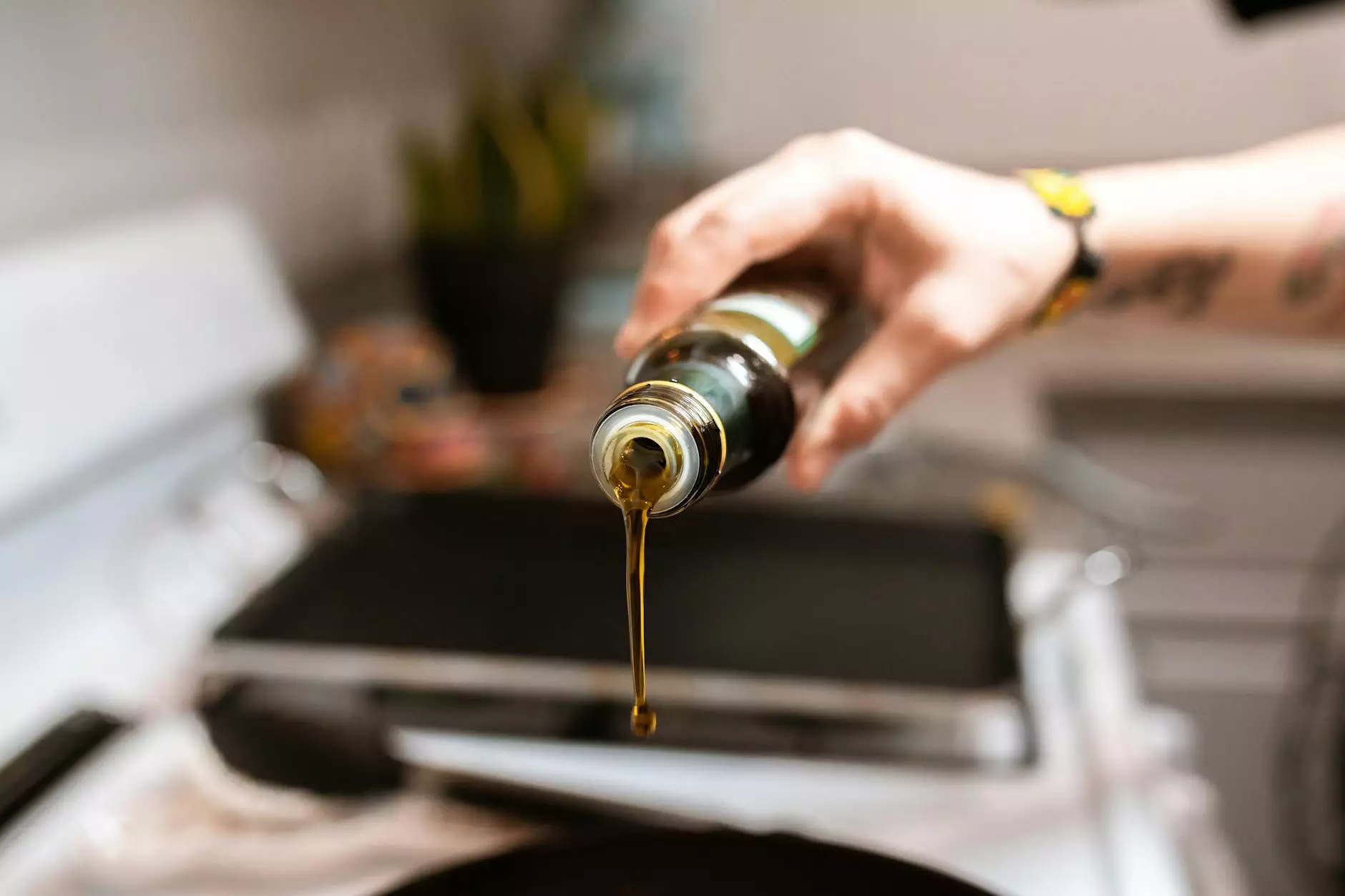Unlocking Business Potential with Waste Used Cooking Oil: Insights from a Leading Sunflower Oil Supplier

In today's rapidly evolving global economy, sustainability and innovation are at the forefront of successful business models. Among the emerging opportunities, the management and utilization of waste used cooking oil stands out as a lucrative and environmentally responsible venture. As a premier Sunflower Oil Supplier, refinesunfloweroil.com recognizes the immense potential and benefits that proper handling and recycling of waste used cooking oil can bring to your enterprise.
Understanding Waste Used Cooking Oil: What It Is and Why It Matters
Waste used cooking oil refers to the leftover oil collected after cooking processes in restaurants, food processing industries, catering services, and households. It often contains food particles, residues, and impurities that make it unsuitable for direct consumption but ideal for other industrial applications. Proper management of this waste stream is crucial, not only for environmental protection but also for transforming potential waste into valuable resources.
The Business Advantages of Collecting and Recycling Waste Used Cooking Oil
Engaging in the collection, recycling, and repurposing of waste used cooking oil offers a multitude of benefits for businesses and entrepreneurs. Below are some compelling reasons to consider this venture:
- Environmental Sustainability: Proper recycling reduces pollution, prevents illegal dumping, and minimizes environmental hazards caused by improper disposal.
- Profitability: Waste cooking oil is a valuable raw material for biodiesel production, animal feed, and industrial lubricants, providing numerous revenue streams.
- Cost Savings: Instead of paying expensive disposal fees, businesses can convert waste oil into income, turning a waste problem into an opportunity.
- Regulatory Compliance: Proper management ensures compliance with environmental laws and regulations, avoiding legal penalties and enhancing brand reputation.
- Corporate Social Responsibility (CSR): Demonstrating commitment to sustainability enhances public image and consumer loyalty.
The Path from Waste Used Cooking Oil to Commercial Products
The transformation of waste used cooking oil into valuable products involves several key processes. Each step is essential to ensure maximum purity, safety, and product quality:
1. Collection and Storage
Efficient collection systems must be established with restaurants, catering companies, and households. Proper storage tanks prevent contamination, and adherence to hygiene standards ensures oil quality before processing.
2. Filtration and Cleaning
Filtering out food residues, water, and particulates is vital. Advanced filtration techniques, such as centrifugation and sedimentation, help produce a cleaner oil suitable for industrial use.
3. Conversion into Biodiesel
The primary industrial application of recycled waste used cooking oil is biodiesel production. Transesterification reactions convert triglycerides into fatty acid methyl esters (FAME), a renewable fuel source. This process not only reduces greenhouse gases but also offers a sustainable alternative to fossil fuels. Leading sunflower oil suppliers like refinesunfloweroil.com are pioneering in providing high-quality raw materials for biodiesel industries.
4. Production of Animal Feed and Industrial Lubricants
Beyond biodiesel, processed waste cooking oil can be refined into animal feed supplements or industrial lubricants, expanding the product portfolio and business avenues for entrepreneurs.
Environmental Benefits of Recycling Waste Used Cooking Oil
By effectively managing and recycling waste used cooking oil, businesses contribute significantly to environmental preservation. Some notable benefits include:
- Reduction in Greenhouse Gas Emissions: Converting waste oil into biodiesel cuts down carbon emissions compared to conventional fossil fuels.
- Less Soil and Water Pollution: Proper disposal prevents leaching into soil and water sources, safeguarding ecosystems.
- Waste Minimization: Recycling reduces the volume of waste sent to landfills, decreasing land use and methane emissions.
- Promotion of Circular Economy: Empowers industries to reuse resources, fostering sustainable growth.
Legal and Regulatory Considerations
Managing waste used cooking oil involves complying with national and local regulations aimed at environmental protection. Many regions have strict guidelines regarding collection, transportation, storage, and disposal. Partnering with reputable suppliers and recyclers ensures adherence to safety standards, licenses, and permits. Additionally, transparency and documentation foster trust and facilitate audits.
How Businesses Can Effectively Start Using Waste Used Cooking Oil
For entrepreneurs and companies interested in capitalizing on this renewable resource, here are actionable steps:
- Identify a Reliable Supplier or Collection Partner: Collaboration with entities like refinesunfloweroil.com guarantees high-quality raw material and compliance with standards.
- Implement Collection Infrastructure: Invest in storage tanks, transport vehicles, and logistical planning for efficient collection processes.
- Develop Processing Capabilities: Establish or partner with facilities capable of filtration, purification, and conversion to target products.
- Market the Recycled Products: Focus on eco-conscious consumers, biodiesel markets, animal feed manufacturers, and industrial sectors.
- Ensure Regulatory Compliance: Stay updated on legal requirements, obtain necessary permits, and maintain accurate records.
Business Strategies to Maximize Revenue from Waste Used Cooking Oil
Maximizing profitability involves strategic planning and innovation. Consider these approaches:
- Diversify Product Line: Offer biodiesel, animal feed, and industrial lubricants to expand market reach.
- Invest in Technology: Utilize the latest filtration and processing technologies for higher efficiency and product quality.
- Build Strong Partner Networks: Collaborate with restaurants, food processors, and logistics providers for a consistent supply chain.
- Focus on Branding and Certifications: Emphasize eco-friendly practices to appeal to environmentally conscious customers and secure certifications that enhance credibility.
- Stay Informed and Adaptive: Continually monitor market trends, regulations, and technological advances to stay ahead of competitors.
The Future of Waste Used Cooking Oil in the Global Market
The demand for sustainable and renewable energy sources is exponentially increasing. The waste used cooking oil industry is poised for expansion, driven by global policies supporting clean energy and waste management. Innovations in processing techniques and diversification of products will open new avenues, including biojet fuels, bioplastics, and specialty chemicals. Leading sunflower oil suppliers are playing a critical role by providing high-quality raw materials and supporting companies in this green transition, ensuring a profitable and environmentally responsible future.
Partnering with a Trusted Sunflower Oil Supplier for Your Waste Oil Business
Choosing the right Sunflower Oil Supplier is crucial for successful waste used cooking oil management. A reputable supplier like refinesunfloweroil.com offers superior quality sunflower oils that can serve as raw materials in various industries, including biodiesel. Their expertise and commitment to sustainability make them an ideal partner for your business.
Conclusion: Transforming Waste into Wealth
In conclusion, the management and utilization of waste used cooking oil present an extraordinary opportunity for entrepreneurs and businesses to contribute to environmental sustainability while unlocking new revenue streams. The process involves strategic collection, careful processing, and innovative product development, supported by strong partnerships with reliable suppliers such as refinesunfloweroil.com.
By embracing these practices, your enterprise can not only achieve financial growth but also play a vital role in promoting a cleaner, greener planet. The transformation of waste into valuable products epitomizes the principles of the circular economy and sustainable development—an essential pathway toward future-proof business success.
Start Today: Embrace the Business of Waste Used Cooking Oil
Take action now by building alliances, investing in technology, and focusing on sustainable practices. The market for recycled waste used cooking oil is growing, and early movers will reap significant benefits in profitability, brand reputation, and environmental impact. Remember, the future belongs to those who innovate responsibly and prioritize ecological stewardship.
For quality raw materials, expert guidance, and sustainable solutions, trust refinesunfloweroil.com, your leading Sunflower Oil Supplier.









